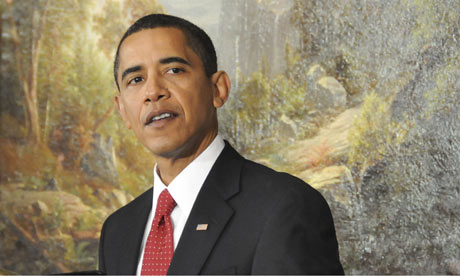Campaign pledge to quickly pass laws to cut emissions faltering in the first weeks of his presidency

Barack Obama is easing up on emissions rule pledge. Photograph: Patrick Leahy/AP
Barack Obama has been forced to slow down early legislation to reduce the CO2 emissions that cause global warming, a key green objective of his presidency.
Officials conceded that Congress is unlikely to pass such legislation by the end of 2009, a delay that could hurt efforts to reach a global treaty at the climate change conference in Copenhagen this December.
It also frustrates hopes that last week's huge infusion of green investment in the $787bn (£546bn) economic rescue plan would give momentum to efforts to cut greenhouse gas emissions.
Presidential staff say America remains determined to play a leadership role at the climate talks in Copenhagen, but downplay prospects of taking steps to curb its own carbon emissions first.
"What is necessary is for us to demonstrate some leadership," Nancy Sutley, the chair of the White House Council on Environmental Quality, said. She brushed aside the idea that climate change legislation would be seen as evidence of leadership. "I wouldn't comment on whether that is the only thing that would show leadership. It is still early on," she said.
Sutley spoke to reporters on Monday after a speech at a new centre on the law and climate change at Georgetown University in Washington DC. The White House press secretary, Robert Gibbs, also indicated on Monday that Obama was easing up on his timetable for climate legislation. He told reporters the president would support moves by Congress to act on global warming "whether that's this year or next year".
The shift appeared to be an attempt to downplay expectations for further dramatic action on the environment. It was also testimony to deep Republican resistance to the White House.
Obama's early moves on the environment – and the huge green investment in last week's economic rescue package – had raised expectations for further green legislation.
American environmentalists had routinely described the economic rescue plan as a "down payment" on a new green economy, that would need to be followed up if its potential were not squandered. Legislation to reduce CO2 emissions was seen as a crucial part of that follow-up.
Environment ministers also believe the US would be on a better footing at the Copenhagen conference to press for action from other big polluters, such as China and India, if it could show it was addressing the same problems at home.
Democratic leaders in the House of Representatives had promised legislation on CO2 reductions by the end of May. The Senate is operating on a longer time scale – though the Democratic leadership too has promised to introduce legislation before Copenhagen.
But the White House now evidently believes that both those schedules are unrealistic after the wrangling in Congress over the economic rescue plan.
The rescue plan ran into concerted Republican opposition, preventing Obama from making good on an election promise to end partisan bickering in Washington.
The White House is still trying to build political support for its green agenda. Governors who gathered at their annual meeting in Washington last weekend were briefed by the Obama green team.
Obama also told the governors he supported a cap and trade regime, the Washington governor, Christine Gregoire, said. But he said it would be harder to get such legislation through Congress amid the rows over the economic rescue plan.
"The president said it nicely: 'That as complex as the stimulus package has been, cap and trade will become as well'," Gregoire said.

No comments:
Post a Comment